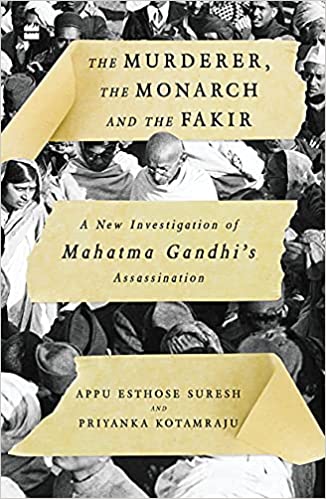Why I picked this book?
I enjoy reading historical books, especially about modern Indian history. The murder of Gandhi, though, looks like a straightforward case, but it has many layers to it. This book seems to dig deep into the circumstances behind the murder and the motive and planning of the murder. So, to get some more insight and information, I decided to read The Murderer, The Monarch, and The Fakir.
The Book
The Murderer, The Monarch And The Fakir is a work of investigative journalism to learn more about Mahatma Gandhi’s assassination. The authors go through many intelligence and police reports regarding the murder of Mahatma Gandhi. They reviewed and analyzed the Kapoor Commission report, initiated in 1966 and completed in 1969. This commission was formed to inquire about the murder conspiracy of Mahatma Gandhi. The authors examine the potential role of the princely states and the right-wing Hindutva group in the conspiracy to kill Gandhi. It also finds many lapses in the investigation and trial of the murders of Gandhi.
It is a well-known fact that the Hindu Mahasabha did not participate in India’s freedom struggle. When India won independence in 1947, they (people with Hindutva ideology) did not get representation in the government. Hindu Mahasabha and the many princely states assumed themselves to be the de facto representatives of Hindus and Hindu culture, and hence the rightful inheritors of power in India. The only problem was Congress and Mahatma Gandhi, who wanted India to be a secular country.
Hindu Mahasabha and RSS were never in sync with the politics of Congress and Gandhi. When India was focusing on freedom from the British, the Hindu Mahasabha and RSS were focusing their energy on Hindu consolidation. They had some major ideological differences with Congress and, in turn, with Gandhi. These ideological differences converted into a deep hatred for Gandhi over the years, so much so that he was killed for it.
The authors, with the help of intelligence and police reports and the findings of the Kapur commission reports, try to explain that the killing of Gandhi was more than a murder by a Hindu fanatic. They give details about the activities that happened before and after the murder of Gandhi. The attempt to kill Gandhi on 20th January 1948, in which Madanlal Pahwa was apprehended after he threw the bomb. What are the circumstances under which Madanlal came into contact with other conspirators? What convinced him to throw a bomb at the prayer gathering of Mahatma Gandhi? There are a lot of details and findings that tell us about the planning and the reasons for the murder.
“When rapid and tragic change occurs in a society, with ethno-nationalism based on religion, geography, or ethnicity at its nucleus, then the definition of who qualifies as a full member of that society narrows down. This process is called ‘othering’. It was not surprising, then, that hundreds of Hindus and Sikhs like Madanlal in India, Muslims in Pakistan felt unbridled anger and hatred towards members of other communities who had once been their neighbours.“
The authors document how Gandhi’s death was celebrated by some in Gwalior by distributing sweets. What was the plan and motive of the people who conceived the idea of killing Gandhi? While you go through the book, you will understand that it is not merely a murder but more than that. The ideology that killed Gandhi never became a part of the normal discourse of India and Indian politics, thanks to Jawaharlal Nehru. Things are changing now. The process of ‘othering’ is moving at a very fast pace, and there is a constant push to make India an ethnic democracy, which doesn’t bode well for the country.
The Murderer, The Monarch And The Fakir is an interesting book that takes you back to 1948 and recreates the scene of the murder of Gandhi. You feel like you are there, and you can visualize the events happening right in front of you. If you like reading history and historical events, you will enjoy reading this one.
About the Authors
As an investigative journalist, Appu Esthose Suresh did extensive work on the changing pattern of communal riots in India, making a significant contribution towards understanding a sensitive and complex topic. He completed his studies at St. Stephen’s College, New Delhi, and LSE.
Priyanka Kotamraju is a Gates Cambridge scholar pursuing a doctorate in sociology at the University of Cambridge and a Senior Atlantic Fellow at the International Inequalities Institute at LSE. She has worked with the Indian Express and the Hindu Business Line. She is the co-founder of Chitrakoot Collective, a grassroots feminist research collective.
Our Verdict
An interesting and insightful book that provides you with details surrounding the murder of Gandhi. Building their book on various intelligence and police reports and their investigative journalism, they shed some light on the most controversial murder of Independent India. A great read for anyone who enjoys reading history and historical events.
